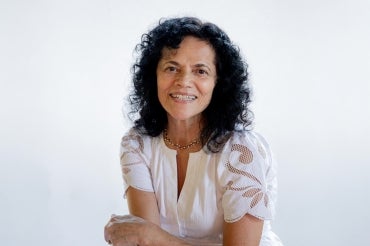Canada's net-zero transition should place equity at the forefront: U of T Scarborough professor

Professor Patricia Romero-Lankao says equity must be a core consideration of Canada's transition to a net-zero future (supplied image)
Published: November 16, 2023
For the last year and a half, the University of Toronto’s Patricia Romero-Lankao has been leading social and policy approaches for a City of Los Angeles project that examines how clean energy transitions can address – and not exacerbate – equity issues.
On Thursday, the LA100 Equity Strategies initiative published its final report about how Los Angeles’s clean energy future can take place in an equitable manner.
The same day, Romero-Lankao, a professor in the department of sociology at U of T Scarborough, was named a Canada Excellence Research Chair in Sustainability Transitions by the Social Sciences and Humanities Research Council of Canada (SSHRC). The position comes with $8 million in research funding that will help Romero-Lankao bring her expertise to bear on how Canada, too, can bolster equity as it transitions to a net-zero carbon future.
“I think we are now in a watershed. We are moving more from the problem to the solution space,” says Romero-Lankao, “We need to focus more on who pays for what, who benefits and who bears the negative impacts so that it’s win-win.”
As cities around the world embark on plans to phase out fossil fuels, they’re also grappling with the fact that their most disadvantaged residents are already being left behind in the clean tech movement.
Los Angeles, for example, plans to power the entire city with clean electricity by 2035. While wealthier Californians slash their carbon footprints and energy bills by buying electric vehicles and installing solar panels, more than 16 per cent of the city's population live below the poverty line — nearly a third of these low-income households can't afford necessary amenities such as air conditioning in the sweltering climate.
Many of the report’s findings stem from Romero-Lankao’s work with community organizers to hold sessions where community members could share their lived experiences, including how past policies and programs failed them.
Key to much of Romero-Lankao’s work is recognition justice — the understanding that past energy projects left severe and ongoing damage to communities through practices like redlining (targeting marginalized areas for high-risk loans) and neglect of housing and infrastructure.
Historically, the people making the lowest incomes shoulder most of the health and socioeconomic impacts of living and working near power plants and refineries, Romero-Lankao says. She adds equity in energy transitions means concentrating the benefits in those communities, while ensuring the inevitable burdens – such as noise from wind farms or impacted property values – don’t again fall on them.
Through analysis and ongoing community feedback, Romero-Lankao and the team designed a series of measures to expand marginalized communities’ access to clean energy, energy-efficient and climate-controlled housing, and affordable electric transit, putting the city on track to meet all their equity goals.
The strategies build on another one of Romero-Lankao’s recent papers, published in Nature Energy, which created a framework to help governments, technology developers and other practitioners launching large-scale green energy projects to hold community dialogues that highlight and address equity issues.
“There is more to our transition than all our beautiful technological ideas; there is a decision-making that politicians and coalitions have to make differently with communities, and this reconfiguration of power is something to catalyze,” she says.
Romero-Lankao has spent decades fighting to make social science an integral part of environmental work. For almost 20 years she was a social scientist for the U.S. National Center for Atmospheric Research. In addition to publishing 148 peer-reviewed papers, she was the co-leading author of a working group that helped create a ground-breaking assessment report that earned a Nobel Peace Prize for the United Nations' Intergovernmental Panel on Climate Change.
Romero-Lankao’s work as a Canada Excellence Research Chair will include centering communities in knowledge production and mobilization as she builds a data repository and toolkits to help make Canada’s net zero carbon transitions equitable. She has found that marginalized communities in Canadian cities – who spend a larger-than-average share of their incomes on energy bills – are particularly concerned about the consequences of clean energy, such as the health impacts of lithium mines, and how the workforce will change.
“I want to create a hub or a platform for us to connect our research with teaching, students, and learning from and with communities,” she says. “I want to be very experimental and risk-seeking, and ensure that we are known for doing amazing work in a couple of years.”



